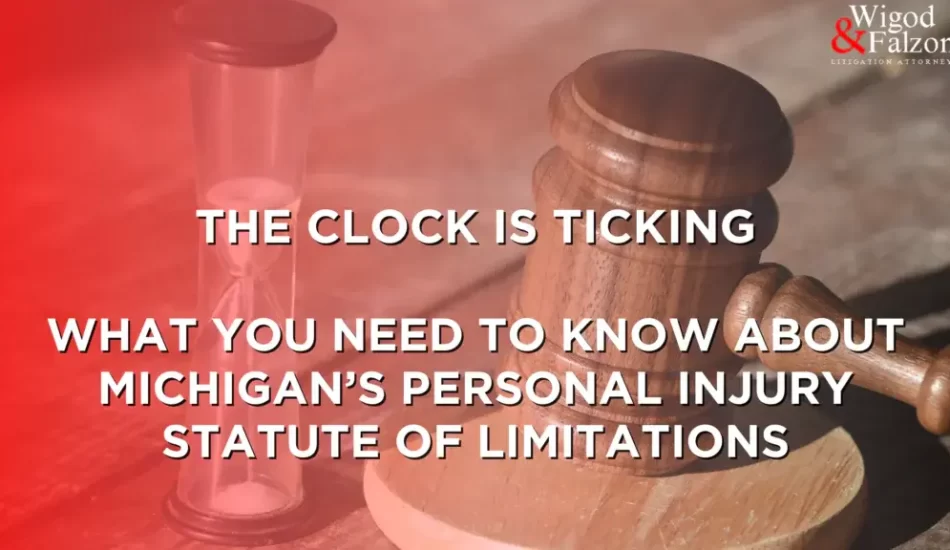The Clock is Ticking: What You Need to Know About Michigan’s Personal Injury Statute of Limitations

When an individual suffers an injury due to another’s negligence or wrongdoing, the justice system offers a pathway for victims to seek compensation. However, there’s a catch: you can’t wait indefinitely to take legal action. This is where the Michigan “statute of limitations” for personal injury cases comes into play.
What Is a Statute of Limitations?
At its core, a statute of limitations is a law that sets a deadline by which a particular legal action must take place. If an individual waits too long and misses this deadline, they typically lose their right to bring the claim to court. Understanding this timeframe is critical for those seeking justice, as it ensures their rights are protected and they can pursue the compensation they deserve.
The primary purpose of a statute of limitations is twofold: first, to ensure the timely resolution of disputes, and second, to provide potential defendants with predictability and protection against outdated claims.
For the sake of a fair trial, the law sets these time limits to guarantee claims rely on fresh and dependable evidence. It strikes a balance between allowing victims ample time to file a lawsuit and giving a defendant a fair opportunity to present their defense.
Statute of Limitations for Personal Injury Claims in Michigan
In Michigan, the general rule for personal injury claims stipulates that individuals have three years from the date of the injury to file a lawsuit.
While this three-year window serves as a standard guideline, there are exceptions. Awareness of these nuances is crucial, as they could significantly impact your ability to seek compensation and justice.
Exceptions to Michigan’s Personal Injury Claims Statute of Limitations
While the three-year window serves as a foundational rule in Michigan for personal injury claims, it’s vital to understand that several exceptions can modify this timeframe:
- Injuries that aren’t immediately discovered (Discovery Rule): Medical malpractice cases present a very unique set of rules in regard to the statute of limitations. Generally speaking, the statute for medical malpractice cases is two years from the date of the malpractice event or six months after discovery, but no case over five years from the date of the event. In addition, there are provisions in the Michigan statute regarding malpractice that had to be adhered to. It is a complicated situation and one should consult an attorney to verify whether their case is still viable under the rules of the Statute of Limitations.
- Claims against government entities: In Michigan, claims against government entities must be made within two years of the date of the accident. In addition, there are notice requirements within thirty days and sixty days depending on the entity that caused the injury. Consult with legal counsel when dealing with government bodies to understand the specific time constraints and requirements
- Claims involving minors or individuals declared mentally incompetent: For minors (individuals under 18) or individuals declared mentally incompetent, Michigan typically “tolls” or pauses the statute of limitations. The clock will generally start running once the minor reaches the age of 18 or once the individual regains competency. However, be aware that when a minor reaches the age of 18, they do not have an additional three years under the normal Statute of Limitations, but it is reduced to one year from the date they turned 18.
If you believe any exceptions might apply to your situation, seeking legal advice promptly is essential.
Tolling the Statute of Limitations for Personal Injury Cases in Michigan
In the legal context, tolling refers to the temporary suspension or pausing of the statutory time limit. When the statute of limitations is tolled, it stops the countdown, ensuring that certain external factors do not unfairly prevent a claimant from filing a lawsuit.
In Michigan, several conditions can lead to the tolling of the statute of limitations:
- Minors and Mental Incompetency: As previously mentioned, the statute of limitations is typically tolled for minors (under 18) or individuals declared mentally incompetent. This means the countdown for them to file a personal injury claim doesn’t commence until the minor turns 18 or when the mentally incompetent individual regains competency.
- Absence from the State: Michigan does not typically toll a Statute of Limitations if a Defendant, the person being sued, leaves the State after causing harm. However, certain protections for members of the Armed Forces who are Michigan residents or who are involved in an accident while in the State of Michigan are in place. You should consult with an attorney if your accident involved an active member of the Armed Forces.
- Judicial Proceedings: In situations with a significant delay in service or judicial proceedings affecting the commencement of the lawsuit, the statute might be tolled to allow for fair litigation.
It’s vital to recognize that tolling doesn’t eliminate the statute of limitations; it merely pauses it. Once the reason for the tolling ceases, the clock starts running again.
Given the complexities surrounding tolling provisions, if you suspect your situation may warrant tolling, it’s imperative to consult with a personal injury attorney familiar with Michigan law to navigate the specifics.
Tips for Protecting Your Rights to File a Personal Injury Claim in Michigan
If you or a loved one has experienced a personal injury, the pathway to justice and compensation begins with proactive measures.
While Michigan’s statute of limitations offers a defined window, acting swiftly and judiciously can fortify your claim. Here are essential tips to help safeguard your rights:
Documenting All Aspects of the Injury and Subsequent Treatment
Memories fade, but documented evidence can provide a solid foundation for your claim. From the moment an injury occurs, start compiling a record. This includes photographs of injuries, accident scenes, witness testimonies, medical reports, and receipts from any treatment or rehabilitation.
Consultation with an Attorney as Soon as Possible
While you might be in the midst of recovery, timely legal consultation can be pivotal. An experienced personal injury attorney can guide you through the intricacies of Michigan law, identify potential pitfalls, and strategize the best course of action.
Their expertise can not only help in understanding the nuances of the statute of limitations but also in building a solid case.
Keeping Track of Relevant Dates
Mark the date of the injury, the discovery of any latent injuries, and all relevant legal deadlines. Setting reminders or maintaining a dedicated calendar can ensure you’re always ahead of any impending timelines.
Navigating the aftermath of an injury can be challenging, and while Michigan law offers victims an opportunity to seek justice, this window is not infinite. The repercussions can be severe if one misses the statute of limitations deadline.
No matter its merit, the court will typically decline to hear the case. Understanding the statute of limitations for personal injury claims in Michigan is vital to ensure that your rights are protected, and that you can secure the justice and compensation you deserve.
File Your Personal Injury Claim Now Before It’s Too Late
If you believe you have a personal injury claim in Michigan or are uncertain where you stand, seeking legal advice early can make all the difference. The personal injury attorneys at Wigod & Falzon have a legacy of championing victims’ rights. With our expertise, dedication, and in-depth knowledge of Michigan law, we are ready to offer guidance, support, and advocacy.
Plus, we work on a contingency fee basis. This means the attorney fee and costs of handling the case is paid with a percentage of the settlement or judgment the client receives from their personal injury case.
Simply put, no recovery = NO FEE.
We specialize in personal injury cases, including car accidents, medical malpractice, and workers’ compensation. Don’t leave your future to chance—reach out for a free consultation and let Wigod & Falzon be the voice that fights for you.
Disclaimer: This blog post is intended for informational purposes only and should not be construed as legal advice. Consult with a qualified attorney for advice regarding your situation.


